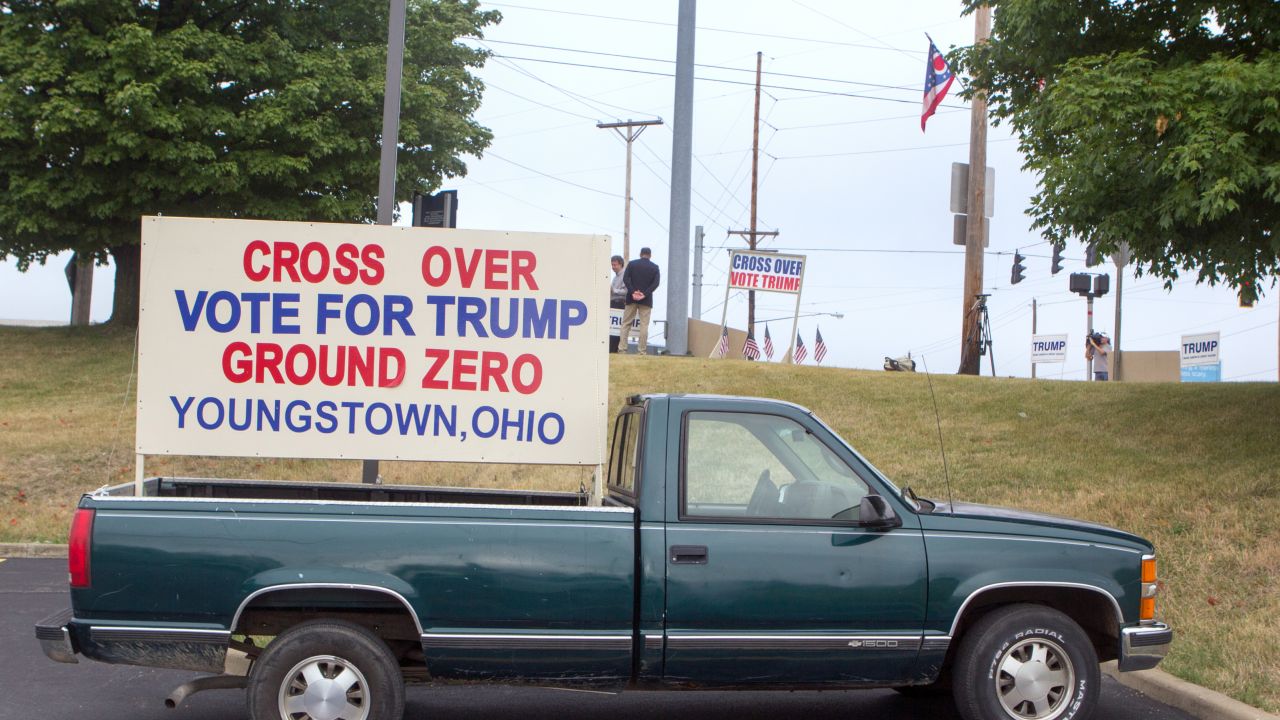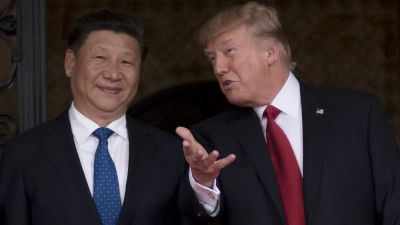
In Youngstown, Trump supporters rallied the day before Hillary Clinton and Tim Kaine visited the former steel town. (Photo by Sean T. Posey)
EDITOR’S NOTE: As many experts have observed, this year’s presidential election could come down to a battle for votes Democrats used to take for granted.
Donald Trump is making an overt play for the so-called “Reagan Democrats,” blue collar voters whose defection three decades ago shook up the national political landscape and stoked the Reagan revolution. It’s no accident that Hillary Clinton’s first post-convention foray was into once reliably Democratic steel and coal country. Now, as then, the issues facing these voters are job and income security in a changing world. Only now, those concerns are being felt by far more than the steelworkers and their families whom Ronald Reagan wooed in 1980.
America’s deindustrialized heartland embodies one of the challenges reshaping the nation’s politics: The disappearance of the middle class and the growing gap between the haves and have-nots. That’s why BillMoyers.com is paying particular attention to these communities this year, focusing on their issues and giving voice to the people who live there. You can read more of our collection here.)
Twenty-four years ago, then-Democratic nominee Bill Clinton spoke to an enormous crowd of 8,000 people in front of the Southern Park Mall in Boardman, Ohio, a suburb of Youngstown: “When I’m elected president I won’t forget you,” Clinton intoned. Part of his assurances was promised support for the potential relocation of a Pentagon accounting center to the area, which could have meant upwards of 7,000 white-collar jobs.
Supporters lined up for hours to catch a glimpse of ‘The man from Hope,’ and some in the crowd even toted “Hillary for President” signs. Clinton easily carried Youngstown and surrounding Mahoning County that November, yet those thousands of government jobs never emerged. Newly elected President Clinton instead made NAFTA a top priority, which led to enormously strained relations between himself and the area’s late, legendary congressman, James Traficant Jr.
On Friday, the day before Hillary Clinton brought her presidential campaign to Youngstown for one of its first general-election campaign stops, a very different scene unfolded on the site of her husband’s 1992 rally. Carrying signs that read, “Where are the jobs, Bill?” and “Cross over, vote Trump,” a contingent of Donald Trump supporters made their case for the cameras.
This protest represented more than just a photo op. Since Trump announced his candidacy, the office of Mahoning County GOP Chairman Mark Munroe has been a veritable hotbed of activity. During the March presidential primary, 6,000 Democrats crossed over to vote Republican, with Trump being the principal beneficiary.
According to Munroe, “Republican Party registration in this county more than doubled because of Donald Trump and the Republican Primary. Absolutely stunning.”
In Mahoning County, one of the country’s most reliable Democratic bastions, a revolt is brewing that has the potential to turn the Buckeye State red, upending Hillary Clinton’s presidential ambitions.
The heart of Mahoning County is the embattled city of Youngstown. In 1930, Youngstown was the forty-fifth largest city in the country. Some of America’s most brutal labor fights played out in Youngstown: Striking steelworkers died on the area’s streets in 1916 and in 1937 during the “Little Steel Strike.” Bars with names like the New Deal Tavern served the rivers of men that poured out of the mills during shift changes. After the unionization of steel, Mahoning County’s men and women earned some of the highest manufacturing wages in the world.
Today, all that is gone. The area’s once-vibrant steel industry collapsed in the late 1970s. (The Mahoning Valley’s last blast furnace is currently being demolished.) Youngstown’s population has declined from a peak of 170,000 to 65,000. Between 2001 and 2013, Mahoning and Trumbull county lost 25 and 56 percent of their manufacturing jobs, respectively. The urban decay that rotted out the city’s neighborhoods is now spilling into the suburbs.
— Jessica Thompson
But through it all, Mahoning County remained a blue-collar bastion, loyal to FDR’s Democratic Party. Yet today’s party is long-removed from its New Deal roots, and after generations, a Republican revival led by Donald Trump, a billionaire populist whose fiery rhetoric and deliberately outrageous demeanor recalls that of the late, proudly loud-mouthed Traficant, is roiling the seemingly long-settled tides of political life here.
“I was a Democrat in 2008,” Shirley McMahon, a resident of Canfield said at Friday’s pro-Trump rally. “I actually voted for Obama.” Today, she’s a Trump supporter.
“I don’t trust Hillary; I think she’s a lifelong, corrupt politician,” she added. “Promises weren’t kept. It’s the lies, the promises, going way back to when [Bill] Clinton was here, and the catastrophe of our steel industry. We need someone to come in here and change things.”
Jessica Thompson of Boardman said she was a lifelong Democrat who even received an invitation to Barack Obama’s presidential inauguration in 2008 when she lived in Memphis, Tennessee. Now a Mahoning County resident, she’s firmly in Trump’s camp. She sees Trump as a political outsider who isn’t afraid to speak his mind, and the Democrats seem to have little chance of changing her vote.
“This area has been so economically depressed for so long, and being a Democratic area, what has that done for us?” Thompson asked. “Absolutely nothing. People are tired of being down and being in those lower percentages. They want improvements, and I think that idea that somebody [Trump] is a successful businessman; maybe he can do something no one else has been able to do?”
The local Republican headquarters began receiving a deluge of calls and visitors looking for Trump signs and bumper stickers. Interest in the candidate and the party hasn’t slackened since.
“When I talked to Democrats in particular, I heard something else,” Munroe said. “So many times I heard people saying that the Democratic Party of today is not the Democratic Party of my father or grandfather; it’s not the Democratic Party of John Kennedy. It was just a disgust and disillusionment with what the Democratic Party has done.”
In a shocking upset, Donald Trump won Mahoning County in the Republican primary, besting the favorite son, Ohio Gov. John Kasich, by 13 points. Though Kasich ultimately won he statewide tally, Trump also carried neighboring Trumbull and Columbiana counties. Despite a fierce contest between Hillary Clinton and Bernie Sanders, Republican turnout at the state level surpassed Democratic turnout by 23 percent. (Ohio Democratic Party officials have claimed that a certain percentage of voters crossed over to cast strategic ballots against Trump, but no solid figures exist to substantiate that claim.)
Democratic nominee Walter Mondale carried only six of Ohio’s 88 counties in the election of 1984, but one of them was Mahoning. No Republican candidate since Richard Nixon in 1972 has won Mahoning County in the general election, but this year could be very different. Ohio has voted for the winning presidential candidate in 28 out of the last 30 presidential elections. The Clinton campaign, which has difficulties elucidating a message of change to Rust Belt communities and the white working class, is facing an electoral wild card this general election.
Speaking at East High School, Clinton and her running mate, Sen. Tim Kaine (D-VA) outlined the broad stokes of a massive jobs plan, which they said would be a top priority for their first 100 days in office. Echoing Sanders and Trump, Clinton also talked tough on trade. But promises of job training programs (something President Bill Clinton also promised in the wake of NAFTA) are a tougher sell here. And both Clinton (who played a key role in negotiating the Trans-Pacific Partnership) and Kaine (who touted his support of the TPP as recently as July) will have a lot of work to do to erase their previous support of the unpopular deal.
The Trump effect in Mahoning County and other Rust Belt counties in swing states like Pennsylvania will be key. Even if Trump ultimately comes up short, the impact of his populist campaign could very likely disrupt traditional politics in the Rust Belt for years to come.




